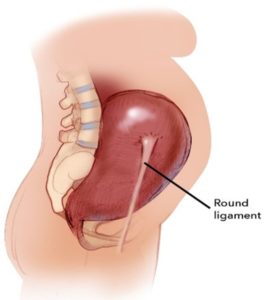Abdominal pain can be a scary thing during pregnancy, but some abdominal pain is completely normal. After all, there is a lot of shifting and stretching going on in that area! One example of this normal (albeit annoying) abdominal pain is round ligament pain. Read on to learn more about round ligament pain, and what you can do to manage the discomfort. You’ll also learn what symptoms warrant calling your doctor.
What Does Round Ligament Pain Feel Like?
This pain is common during the second and third trimesters, as your belly grows. It is characterized by a sharp pain, or jabbing feeling, in the lower belly or groin area that typically lasts only a few seconds. Often it is felt on the right side of the body, but it can also be felt on both sides. Usually the pain occurs with sharp, sudden movements (like sneezing, coughing, or laughing), or with quick changes of body position (getting in and out of a car or moving from lying down to sitting/standing up).
What Causes Round Ligament Pain?
While all ligaments stretch during pregnancy, the round ligament stretches the most. The round ligament connects the uterus to the pelvic bone, as shown below.

As your uterus grows, this ligament stretches from its pre-pregnancy size of about 2 inches to as long as 12 inches by the end of pregnancy! With all this stretching, it is not surprising why round ligament pain is so common. The bigger the belly, the more the round ligament will be stretched.
Tips for Managing Round Ligament Pain
Unfortunately, there is now way to completely avoid this. However, the following tips can help mitigate it:
- Find Neutral Alignment: As the belly grows during pregnancy, it can tip the pelvis forward into an anterior tilt, pulling the low back into an excessive arch, as shown below. This places added stress on the round ligament. Follow these tips to help you find, and move, in neutral alignment to alleviate pressure on the round ligament.

- Strengthen Your “Core Canister”: The deep core muscles of the “Core Canister” (diaphragm, transverse abdominis, and pelvic floor) help to resist the anterior pelvic tilt (pictured above) and pull the body into neutral alignment, which alleviates stress on the round ligament. Begin with the exercise we refer to as the #1 most effective core exercise (360° Breathing). This exercise activates the Core Canister muscles and gets them to work together in harmony.
- Avoid quick changes of body position: This not only goes for workouts, but also in your daily life. For example, when getting out of a car, instead of swinging one leg, then the other try swinging both legs at the same time. In addition, instead of putting on pants by balancing on one leg, sit down to put them on.
- Hinge at hips if coughing or sneezing: If you are experiencing round ligament pain, a flexed hip position during sudden movements helps to avoid adding stretch to the ligament.
- When lying on your side, try placing a pillow between your legs: This minimizes stress on the ligament.
- Consider a compression garment: If pain is bothersome, a compression garment can help minimize stress on the ligament to reduce pain. We love these pregnancy support garments from SRC health. They provide a range of high-quality garments for pregnancy that can be worn under or over your bump. Use code PRONATAL10 for 10% off.
If pain is severe, or accompanied by bleeding, strong cramping, severe swelling, fever, chills, or dizziness, call your doctor.
Additional Support
- If you have painful symptoms, consider wearing a compression garment. We love the range from SRC Health, which offers high-quality garments to wear under and over your bump (use code PRONATAL10 for 10% off).
- For programs and services to help you exercise safely and effectively during pregnancy, check out our training programs & services.
- If you are a health & fitness pro interested in coaching pre & postnatal clients, explore our ProNatal Education & Certification.
Affiliate Notification: The post contains an affiliate link for SRC health. We may earn a commission from purchases made through this link. However, we only endorse companies that we have personally vetted and believe in.
